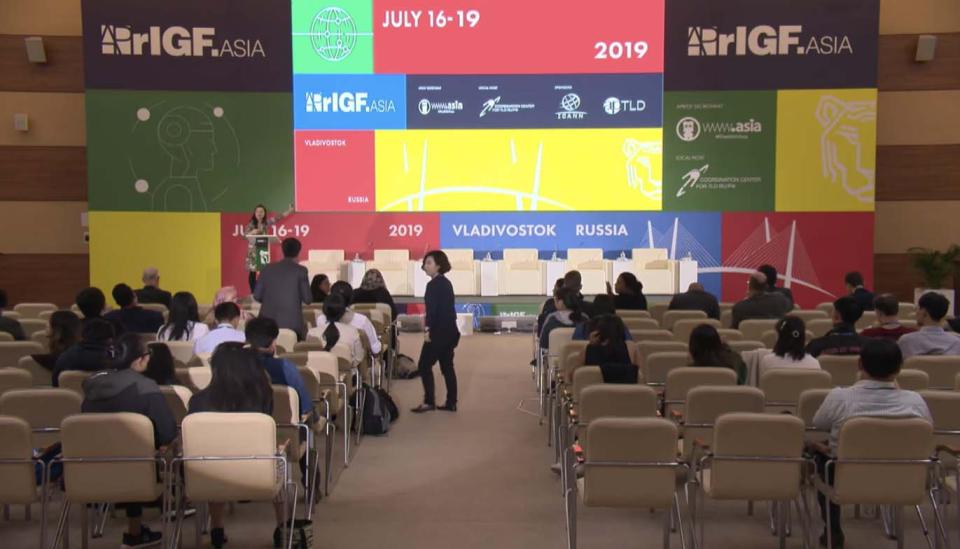
Image description: Plenary session at Asia Pacific IGF 2019 in Vladivostok, Russia.
The Asia Pacific Regional Internet Governance Forum (APrIGF), a multi-stakeholder event that aims to advance internet governance development in the Asia Pacific, has been held every year for the past 10 years in a different country in the region. I had the opportunity to attend my first APrIGF this year, held from July 16-19 in the Far Eastern Federal University, Vladivostok. My first reaction to hearing the venue was surprise and a vague feeling of apprehension, not only since Russia, straddling both Europe and Asia, does not immediately spring to mind when I think of the Asia-Pacific, but also because it is hardly a country known as a beacon for free speech - whether online or offline.
Despite this apprehension, the three-days of the APrIGF was packed with informative sessions and boasted participants from diverse countries across the Asia Pacific. The various sessions included some thought-provoking discussions on key human rights issues affecting the internet including access, internet shutdowns, digital identity systems and privacy, hate speech, child safety, and digital security issues faced by women, queer and trans persons. Listening to the lively exchange of views between the participants from various sectors and noting the lack of an overt government presence, my initial thoughts were that my fears that the location would limit the ability to speak freely were unfounded. However, on closer examination, I realised that there was, in fact, some measure of one of the most insidious forms of restrictions on free speech - self-censorship. For instance, many participants knew of Russia’s infamous “anti-gay propaganda” law, which though technically meant to cover only material aimed at children, has been used to attack LGBTQIA activists and block content. The law has resulted in a chilling effect on free speech, visible even during the APrIGF, where I got the sense that participants were forced to either refrain from addressing issues of sexuality head-on or were taking care to word their interventions and session proposals in a manner that ensured their own safety.
I realised that there was, in fact, some measure of one of the most insidious forms of restrictions on free speech - self-censorship.
The pervasive effect of such laws that restrict human rights on our online lives, was the subject of the panel which I participated in titled "A roadmap for studying ICT laws and building a database for Asia". The workshop was organized by the Association for Progressive Communications (APC) and moderated by Gayatri Khandhadai, Asia Regional Policy Coordinator for APC. It brought together five speakers from four countries. Of the six panellists, there were three men and three women. The workshop began with the moderator explaining the rationale behind the workshop and the need to create a free, online database mapping ICT laws across the Asia-Pacific. She also introduced the CYRILLA Collaborative, a global initiative that seeks to map and analyze the evolution and impacts of legal frameworks in digital environments.
The next speaker was Hong Xue of the Institute for Internet Policy & Law, China. She outlined the major ICT laws in China and highlighted the lack of a comprehensive data protection law which had a serious impact on the right to privacy of users online.
Alexander Isavnin from the Russian Internet Protection Society explained the various laws under which the Russian Government blocked content and websites online, including the Anti-Terrorism Act and the child protection laws which are used to block online content on LGBT issues. He noted that LinkedIn was blocked in Russia under the Personal Data Protection Law since LinkedIn stored user data on servers which were located outside the country.
Eun Chang Choi, National and Regional IGF initiative (NRI) of South Korea IGF provided an overview of the situation in South Korea. In particular, he discussed the impact of a decision by the Constitutional Court of South Korea which rendered certain provisions of law that criminalized speech online as unconstitutional, because the provision was too vague and had a chilling effect on free expression. Interestingly, he noted that this decision was restricting the ability of the government to pass a law aimed at curbing fake news, like many other countries in the region are doing.
Raman Jit Singh Chima of Access Now and Internet Freedom Foundation, India [speaking remotely] highlighted the similarities between ICT legislations across South Asia. He presented on some trends in the region across the last few decades, including the recent trend of passing restrictive cybersecurity laws. He outlined a recent decision of the Indian Supreme Court which upheld the right to free speech online.
The floor was then thrown open for feedback and suggestions. Some of the important conclusions/recommendations that emerged from this discussion are:
- Ensuring accessibility to ICT laws will be useful to many groups, including civil society, activists, businesses (including ISPs), academics and lawyers. Since many existing databases are only accessible upon payment of high fees, many of these groups are currently facing issues in accessing laws.
- There are many obstacles to establishing such a database, particularly the difficulty of ensuring sustainability since ICT laws are changing at a fast pace across the region. Time-stamping the laws and setting aside resources for regular revision of the database could be a potential solution to this obstacle.
- The database could be useful in providing good practice examples of laws and jurisprudence that uphold human rights and limit online censorship, which can be used to advocate for better laws and norms in other countries.
- An emerging trend from the discussion was that many countries in the region had broad, unclear provisions in both internet-specific and general criminal laws which were being used as tools of online censorship by governments.
- Laws are not always the answer! Sometimes less regulation is more permissive to exercising human rights online.
This workshop was clustered under the sub-theme “Safer Internet, Cybersecurity and Regulation”, though it was also related to the sub-theme of “Human Rights Online”. There was only one other workshop under the Human Rights Online sub-theme, which discussed the issue of hate speech. However, the discussions in many of the other workshops addressed human rights issues even if they were not the sole focus of the workshop. Additionally, there was only one workshop which focused on gender issues (Digital Security at the Grassroots: Emerging Needs and Challenges). One of the take-aways was thus the need for future editions of the APrIGF to have more workshops on human rights and gender.
There was only one other workshop under the Human Rights Online sub-theme, which discussed the issue of hate speech
- 4072 views






Add new comment